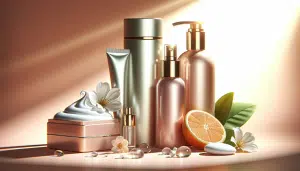You Can Rejuvenate Skin Naturally With These Science-Backed Secrets
Charlotte Stone October 16, 2025
Explore a guide filled with practical, evidence-based approaches for naturally rejuvenating skin. Learn about key skincare ingredients, daily routines, sun protection, sleep’s effect on beauty, and how lifestyle choices play a major role in achieving radiant, healthier-looking skin.
Why Natural Skin Rejuvenation Matters
The wellness and beauty community has seen a dramatic shift toward natural skin rejuvenation methods. This movement favors products and routines that harness plant-based ingredients and gentle, non-invasive treatments. One major advantage is a lower risk of irritation or adverse side effects, especially for people with sensitive skin. Natural approaches also emphasize supporting the skin’s own healing abilities, which research shows can extend the glow and resilience seen with conventional beauty treatments. People turn to these techniques hoping for gentle, long-lasting results. When the skin barrier is respected and nourished, issues like redness, dryness, and breakouts often decrease.
Adopting a natural skincare focus doesn’t only benefit appearance. Many of these practices are designed to work synergistically with lifestyle habits that promote overall wellness. Proper hydration, balanced nutrition, regular sleep, and stress management all encourage healthy, vibrant skin from within. These habits work in tandem with topical routines, supporting cellular repair and collagen production. As more individuals become aware of environmental and ingredient sensitivities, there’s growing interest in transparency about what goes into beauty products. This has inspired deeper scrutiny of labels and a search for well-researched, non-toxic solutions.
Scientific evidence supports many natural rejuvenation strategies. Clinical studies highlight the effectiveness of plant antioxidants, natural oils, and gentle acids in boosting radiance and reducing the visible signs of aging (Source: https://www.ncbi.nlm.nih.gov/pmc/articles/PMC3583892/). However, expectations should remain realistic. While natural approaches can help slow the aging process and improve skin health, long-term consistency and evidence-based routines are essential for seeing real results. Individuals benefit from understanding both the possibilities and the limitations of natural rejuvenation.
Essential Natural Ingredients For Glowing Skin
Certain natural ingredients frequently rise to the top for their proven ability to nourish and rejuvenate the skin. Vitamin C, found naturally in fruits like oranges and strawberries, is well documented for its role in boosting collagen production and protecting against free radical damage. Green tea extract is another favorite due to its rich content of polyphenols, which act as anti-inflammatory agents and brighten dull complexions. Rosehip oil offers a blend of vitamins A and E, supporting repair and hydration.
Aloe vera deserves attention for its calming, hydrating nature and ability to soothe irritation. Studies suggest it promotes wound healing and can ease redness after sun exposure (Source: https://www.mountsinai.org/health-library/herb/aloe-vera). Niacinamide, a form of vitamin B3, improves the appearance of enlarged pores and uneven tone when used regularly. Other popular options include jojoba oil for balancing sebum and hyaluronic acid (when derived from natural fermentation) for deep hydration. These components cater to different skin needs and routines, making them valuable additions to a comprehensive regimen.
Combining these ingredients in personalized routines helps address concerns like hyperpigmentation, fine lines, and dryness. Many brands now offer serums and moisturizers that harness the power of these botanicals without added synthetic fragrances or preservatives. Before introducing new elements, patch-testing is wise, especially for those with sensitive or allergy-prone skin. Consistent use, paired with adequate sun protection, allows these natural wonders to reveal their potential. For those striving for a natural glow, the right ingredient choices are often the foundation of ongoing skin wellness.
The Role of Daily Practices and Gentle Cleansing
Building a healthy, radiant complexion begins with daily habits and gentle cleansing methods. Stripping the skin with harsh soaps or over-exfoliating can damage the protective barrier, leading to increased dryness, irritation, and even premature aging. Experts emphasize using mild, pH-balanced cleansers that remove dirt and oil without disrupting skin’s natural defenses. Lukewarm water helps prevent unnecessary dehydration during washing routines.
Routine exfoliation, when performed using mild natural enzymes or alpha-hydroxy acids (AHAs) from sources like papaya or sugar cane, helps slough away dead cells and enhance natural radiance. It should be done sparingly, typically no more than twice a week for most skin types. Regular moisturizing is critical; products containing squalane, ceramides, or plant-based oils help to lock in moisture. Skincare professionals recommend following up cleansing with hydrators and applying serums or creams while the skin is still damp for optimal penetration.
Establishing a consistent daily skincare routine can improve skin function over time. While it might seem simple, even the act of gently patting the face dry with a soft towel versus rubbing can make a difference in preventing irritation. Protecting skin with barrier creams, especially for individuals exposed to harsh weather, adds another layer of defense. These small practices support the skin’s ability to repair itself and can contribute to healthier, more supple skin in the long run (Source: https://www.aad.org/public/everyday-care/skin-care-basics/care).
Sun Protection and Its Transformative Impact
Perhaps nothing impacts the skin’s health and youthfulness more significantly than diligent sun protection. Exposure to ultraviolet (UV) rays accelerates skin aging and raises the risk of sunspots, wrinkling, and even skin cancer (Source: https://www.cancer.org/healthy/be-safe-in-sun.html). Applying broad-spectrum sunscreen with SPF 30 or higher every day—rain or shine—protects the collagen and maintains skin firmness over time.
Sun protection goes beyond sunscreen. Wearing wide-brimmed hats, seeking shade, and donning clothing with tight weaves are all simple measures that dramatically reduce cumulative sun exposure. Damage often occurs without instant signs, so daily prevention is vital. Some natural mineral sunscreens use zinc oxide or titanium dioxide and are less likely to irritate sensitive skin than chemical alternatives. Reapplication every two hours, especially after sweating or swimming, is necessary for ongoing defense.
Skincare experts also suggest incorporating antioxidants, such as vitamin E or green tea extract, into daily routines to boost the natural defense against UV-related free radicals. By making these habits part of everyday life, individuals can keep their skin looking vibrant and healthy for longer. Adopting sun safe practices is regarded as one of the most effective natural rejuvenation strategies for all skin types and ages.
Sleep, Stress, and the Mind-Beauty Connection
Sleep and stress have direct and visible effects on skin appearance. Lack of rest diminishes skin’s repair processes and increases cortisol levels, which may lead to breakouts, dullness, and premature aging (Source: https://www.ncbi.nlm.nih.gov/pmc/articles/PMC4445892/). During deep sleep, growth hormone stimulates cell and tissue repair—making overnight hours vitally important for beauty.
Chronic stress, if unmanaged, can contribute to inflammatory responses and exacerbate skin conditions like eczema, psoriasis, or acne. Incorporating stress-reduction techniques, such as meditation, yoga, or mindful deep breathing, supports both emotional balance and skin clarity. Balanced routines that include wind-down rituals and digital limits before bed can promote restful, restorative sleep and leave skin looking brighter.
Experts recommend keeping a consistent sleep schedule and creating a relaxing bedtime environment. Simple actions—such as gentle facial massage, aromatherapy, or journaling—can support quality sleep and lower stress. While external products play a role, beauty from within starts with honoring this mind-body-skin connection for optimal rejuvenation outcomes and holistic beauty.
Lifestyle Choices for Lifelong Skin Wellness
Lifestyle habits shape the skin’s health beyond daily topical care. Hydration remains a foundation: skin cells require ample water to maintain elasticity, suppleness, and a natural glow. Consuming antioxidant-rich foods—such as berries, leafy greens, nuts, and seeds—provides internal protection against oxidative stress, which accelerates visible aging. Limiting sugar and processed foods further reduces inflammation, supporting a more resilient complexion.
Regular physical activity increases circulation, aiding nutrient delivery and waste removal for skin that looks refreshed. Avoiding smoking and minimizing alcohol consumption are both critical, as these behaviors are directly tied to premature wrinkles and slower cellular repair. Supportive habits don’t have to be elaborate; simple practices like infusing water with citrus, using herbal teas, and prepping balanced snacks can gradually enhance the way skin looks and feels.
Caring for emotional and physical health holistically pays off in visible ways. Each small lifestyle choice can add up over months and years, preserving the skin’s youthful quality well into adulthood. By focusing on nutrition, exercise, stress management, and hydration, lifelong wellness becomes an achievable reality. Skin often reflects these broader health choices, making them the hidden secrets behind lasting radiance.
References
1. Mukherjee, P. K., Maity, N., Nema, N. K., & Sarkar, B. K. (2011). Bioactive compounds from natural resources against skin aging. https://www.ncbi.nlm.nih.gov/pmc/articles/PMC3583892/
2. American Academy of Dermatology. (n.d.). Skin care basics. https://www.aad.org/public/everyday-care/skin-care-basics/care
3. Mount Sinai. (n.d.). Aloe Vera. https://www.mountsinai.org/health-library/herb/aloe-vera
4. American Cancer Society. (n.d.). Be Safe in the Sun. https://www.cancer.org/healthy/be-safe-in-sun.html
5. Irwin, M. R. (2015). Why sleep is important for health: a psychoneuroimmunology perspective. https://www.ncbi.nlm.nih.gov/pmc/articles/PMC4445892/
6. Harvard T.H. Chan School of Public Health. (n.d.). The Nutrition Source: Antioxidants. https://www.hsph.harvard.edu/nutritionsource/antioxidants/







